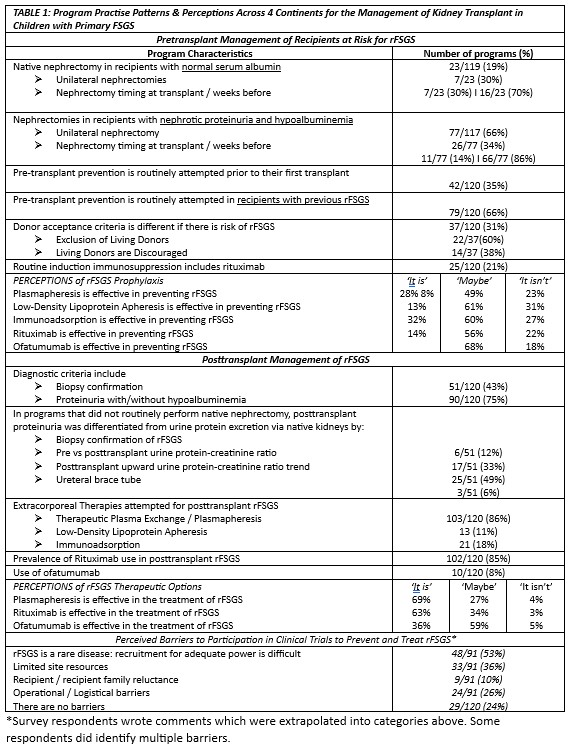Nephrology 1
Session: Nephrology 1
009 - Practice Patterns & Perceptions of Recurrent Nephrotic Syndrome Post-Kidney Transplant in Non-Mendelian Nephrotic Syndrome (FSGS or MCD)
Sunday, April 27, 2025
8:30am - 10:45am HST
Publication Number: 9.6459
Priya S. Verghese, Ann & Robert H. Lurie Children's Hospital of Chicago, Chicago, IL, United States; Matthew G. Switalski, Ann & Robert H. Lurie Children's Hospital of Chicago, Chicago, IL, United States; Antonia Bouts, Emma Children's Hospital Amsterdam University Medical Center, Amsterdam, Noord-Holland, Netherlands

Priya S. Verghese, MD, MPH (she/her/hers)
Professor
Ann & Robert H. Lurie Children's Hospital of Chicago
Chicago, Illinois, United States
Presenting Author(s)
Background: There has never been an adequately powered randomized controlled trial on prophylactic or therapeutic options for primary focal segmental glomerulosclerosis (FSGS) after kidney transplant.
Objective: Our goal was to assess current practice patterns and physician perception on preventive and therapeutic options for pediatric recurrent FSGS (rFSGS) posttransplant and barriers to clinical trials for treatment / prevention of rFSGS.
Design/Methods: A survey was created, modified and approved by the Pediatric Nephrology Research Consortium (PNRC) Protocol Review Committee, disseminated to members of PNRC and the European Society of Pediatric Nephrology (ESPN) via email, and an invitational QR code during the semi-annual PNRC and ESPN meetings. Survey respondents were incentivized with $50 gift cards. Descriptive analysis was performed.
Results: Of 120 respondents, 56, 50, 12, and 2 were from Europe, North America, Asia, and South America respectively. Practice patterns and perceptions on effectiveness of therapeutic modalities varied widely [Table 1]. There were significant differences in management and prevention of rFSGS between Europe and North America suggesting non-scientific rationale for practice pattern differences. Of the 91 /120 (76%) that identified barriers to clinical trial participation, the reasons encompassed difficulty in recruitment, and study operations [Table 1], and they were significantly more likely to be respondents from North America (86% in North America,36% in Europe, p 0.01).
Conclusion(s): Practice patterns and viewpoints of preventive and therapeutic options for rFSGS are divergent across centers and continents. For the successful development and conduct of clinical trials in the devastating cases of recurrence of FSGS after pediatric kidney transplant, a first step could be a multinational, multicenter mixed-method study of medical team opinions and their perceived barriers to participation. A better understanding of subjective factors that dictate a medical providers' decision on how to manage this disease, and how it impacts willingness to participate in research studies, is imperative.
Table 1

Table 2
.jpg)

